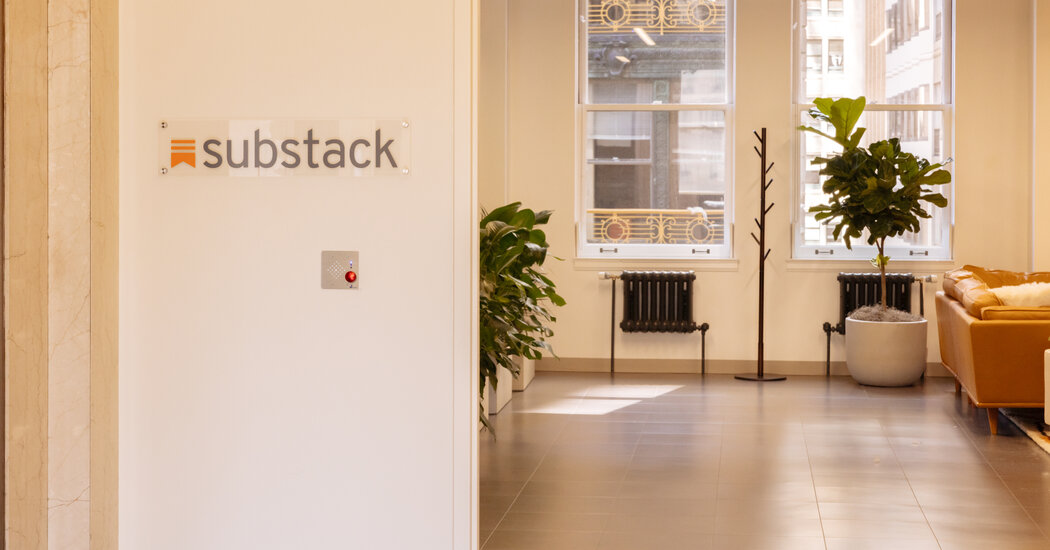Substack, the lavish newsletter platform that has lured prominent writers with promises to cash in on their reader relationships, has halted its fundraising efforts in recent months after the venture investment market cooled in recent months, according to those in the know. decision.
Substack has been in talks with potential investors in recent months about raising $75 million to $100 million to fund the growth of his company, the people said, wishing to speak anonymously only because the conversations were private. Some of the fundraising discussions valued the company between $750 million and $1 billion, they said.
The decision is another sign of the sharp shift from recent go-go years of free-flowing money for young start-ups, especially buzzing, consumer-oriented companies like Substack, which has raised at least $86 million over three funding rounds, according to PitchBook, which tracks funding.
Now investors are preaching austerity and shutting down new deals, especially for companies that spent aggressively on growth with no signs of profit. While Substack is still hiring, other companies have experienced layoffs or lower valuations, some of which to compare this throwback to the years after the 2008 financial crisis or the 2000 Internet bubble.
A spokeswoman for Substack, Lulu Cheng Meservey, declined to comment on the company’s financials or any financing talks. She said the company was still in growth mode, citing a webpage that lists more than a dozen job openings, including a head of growth.
“My comment is www.substack.com/jobs,” she said.
The investment terms under discussion for Substack would have marked a jump in the company’s valuation, which reportedly hit $650 million last year after the company closed a $65 million round of financing from investors, including Andreessen Horowitz.
Substack has told investors it had revenues of about $9 million in 2021, the folks with knowledge of the fundraising talks said, meaning the talks valued the company at a hefty premium to its financial results. Such a high valuation for a company with relatively small revenues was more common in the closing months of 2021, when the stock market was booming and venture capital firms were more optimistic about start-ups.
The company profiles itself as an alternative to established publishers of news articles, graphic novels and books. Substack says it gives writers a fairer share of the revenue from their work. The company takes a 10 percent discount on the total revenue paid to writers by subscribers of their newsletters. Stripe, Substack’s payment processor, takes another 3 percent.
The company has won influential writers, including journalists Matthew Yglesias and Glenn Greenwald, and Heather Cox Richardson, an American history professor. The company’s executives have said that more than a million people pay to subscribe to newsletters on the platform, and that users pay more than $20 million a year to subscribe to Substack’s 10 most popular writers.
But some writers who were initially won over by Substack’s pitch eventually decided to leave the platform, preferring to court their audience directly without paying the company its share. Others were disappointed with the company’s hands-off approach to moderating content on the platform. Last month, The New York Times reported that some newsletter writers were exploring alternatives, such as Ghost, a platform that offers similar services to Substack. Ghost’s open-source publishing platform does not moderate content, but the paid hosting service has some restrictions on content that incites violence or otherwise violates the law.
Substack also faces stiffer competition from major tech companies, along with many of the media companies it seeks to compete with. Twitter, LinkedIn, The Atlantic, and Puck — a start-up founded by Jon Kelly, a former editor at Vanity Fair — all use email newsletters as a channel to engage their audiences and monetize them.
Substack is one of a group of start-ups that began to thrive during the pandemic, and investors began fighting to pump money into it at skyrocketing valuations. But by 2022, some so-called pandemic winners, such as the audio app Clubhouse or the grocery delivery service Instacart, have seen their explosive growth slow as people returned to their daily routines.
Broader economic forces, including higher interest rates, rising inflation and the declining stock market, exacerbated the gloom.
Erin Griffith reporting contributed.

